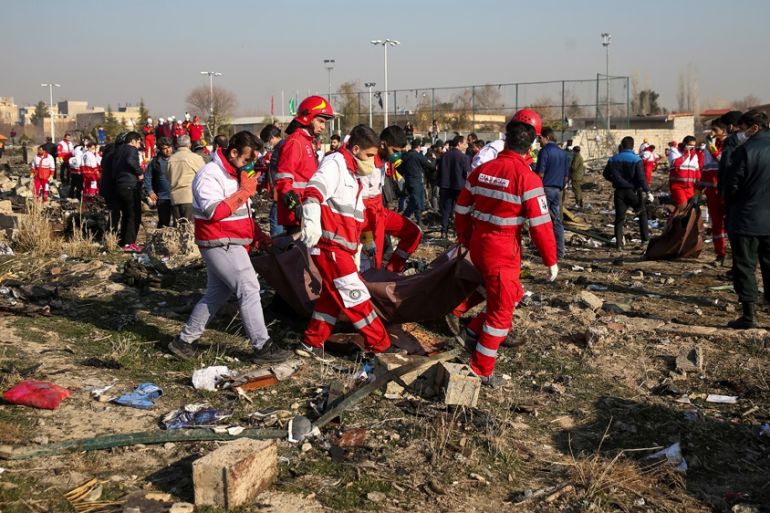Iran issues prison sentences for 2020 downing of Ukraine airliner
Iran has said the suspects include missile defence personnel who made a ‘disastrous mistake’.

Iran’s judiciary has announced prison sentences for 10 unnamed people it says were responsible for the downing of a Ukraine International Airlines commercial flight in January 2020.
The prime suspect in the case, identified only as the commander of the Tor-M1 surface-to-air missile defence system that shot down the plane with two missiles, received a 10-year discretionary sentence for not heeding orders and three years for being “accessory to semi-intentional murder”, according to the official judiciary news site.
Keep reading
list of 4 itemsSaudi foreign ministry says delegation arrives in Iran
Iran to install cameras to identify unveiled women
Analysis: Will Azerbaijan-Iran tensions lead to war?
The unnamed individual will serve a maximum of 10 years in prison, minus time served, and must pay compensation to the families of the 176 victims of the flight, it said.
Additionally, two personnel who were operating the missile system each received one-year sentences, while other officials in Tehran’s air defence controls and the aerospace division of the Islamic Revolutionary Guard Corps (IRGC) were given sentences ranging from one to three years.
The suspects will also reportedly face more punishments that were not specified by the judiciary.
All sentences – issued after 20 court sessions – were preliminary and can be appealed. A military court has also been ordered to continue investigations for other individuals who may have been involved.
According to the judiciary, the case involved 117 plaintiffs, 55 of whom testified in court and were represented by 20 attorneys.
Flight PS752 departed from the Imam Khomeini International Airport in the Iranian capital in the early morning of January 8, 2020 and was shot down minutes after taking off. Iranian authorities initially denied that the plane was shot down but admitted to the “disastrous mistake” three days later.
‘Human error’
Iran’s final report on the downing of the flight said “human error” was the cause since the air defence battery personnel fired the missiles without first obtaining proper clearance from higher commanders, believing that a missile was about to hit Tehran.
The incident occurred shortly after the IRGC fired missiles at two United States bases in neighbouring Iraq in retaliation for the assassination of top IRGC commander General Qassem Soleimani by a US drone.
The judiciary’s report on Sunday also backed this account, saying the personnel had not calibrated the defence system after moving it shortly before the incident, and ignored orders to obtain direct approval for firing during the chaos of that night as Iran expected a potential US attack.
However, a number of the families of the victims, in addition to officials in Ukraine and Canada – which counted dozens of citizens among the passengers killed – have condemned Iran for what they have called a lack of transparency and cooperation.
A Canadian court ruled in 2021 that the downing was an “act of terrorism” amid Tehran’s claims that the case has been politicised. Another court also granted tens of millions of dollars to some of the families that could be taken from Iranian assets in Canada.
Iran’s government in late 2020 set compensation of $150,000 to each of the victims’ families and later said payments have started, but it’s unclear how much has been paid.